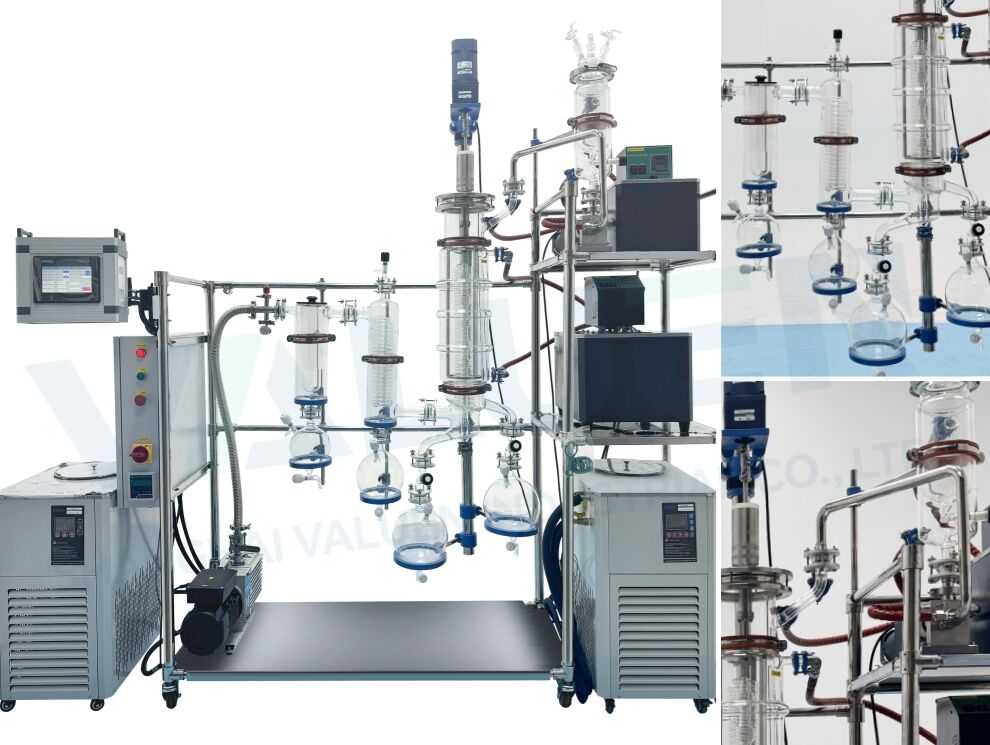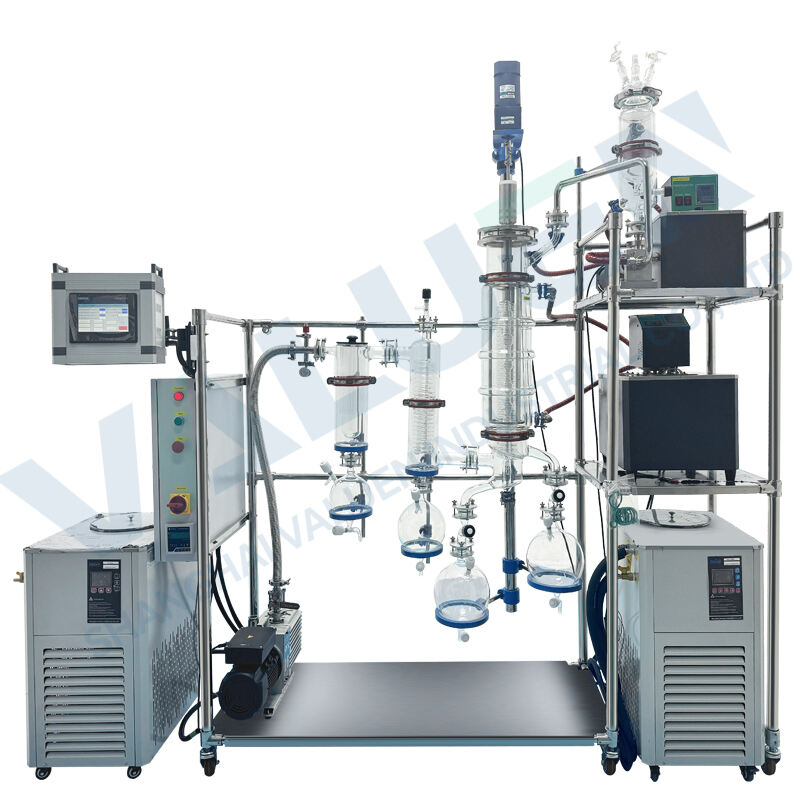Advanced Purification Technology in Modern Chemical Processing
The evolution of separation technology has brought us to an era where achieving ultra-high purity in chemical extraction is not just possible but essential. The glass molecular distillation system stands at the forefront of this technological advancement, offering unprecedented levels of separation efficiency and product quality. This sophisticated technology has revolutionized how industries approach the purification of heat-sensitive compounds, making it an invaluable tool across pharmaceutical, cosmetic, and specialty chemical sectors.
In today's demanding market, where product purity directly correlates with value and effectiveness, the glass molecular distillation system has emerged as a game-changing solution. Its unique ability to operate at low temperatures while maintaining high vacuum conditions enables the separation of complex mixtures without thermal degradation - a capability that traditional distillation methods simply cannot match.

Core Benefits of Glass Molecular Distillation Technology
Superior Separation Efficiency
The glass molecular distillation system achieves remarkable separation efficiency through its innovative design and operating principles. The system's glass construction allows for optimal visual monitoring of the distillation process, while its precisely controlled vacuum environment enables molecular separation at the finest level. This results in extraordinarily pure end products, often achieving purity levels above 99.9%.
The system's ability to maintain consistent temperature control throughout the process ensures that heat-sensitive compounds remain stable and uncompromised. This is particularly crucial when working with valuable materials such as vitamins, omega-3 fatty acids, and pharmaceutical intermediates, where molecular integrity is paramount to product efficacy.
Enhanced Process Control and Visibility
One of the most significant advantages of a glass molecular distillation system is the unprecedented level of process control it offers. The transparent glass construction provides operators with real-time visual feedback of the separation process, allowing for immediate adjustments when necessary. This visual monitoring capability is invaluable for optimizing processing parameters and ensuring consistent product quality.
The system's design incorporates sophisticated control mechanisms that allow for precise adjustment of critical parameters such as temperature, pressure, and feed rate. This level of control ensures reproducible results and helps maintain product specifications across multiple production batches.
Technical Specifications and Design Features
Advanced Vacuum Technology
The heart of any glass molecular distillation system lies in its vacuum capabilities. Modern systems employ state-of-the-art vacuum pumps and sealing technologies to achieve and maintain extremely low pressures, often in the range of 0.001 to 0.0001 mbar. This ultra-high vacuum environment is crucial for enabling molecular separation at lower temperatures, preventing thermal degradation of sensitive compounds.
The vacuum system's design includes multiple safeguards and monitoring points to ensure stable operation and prevent system contamination. Advanced pressure sensors and automated controls work in concert to maintain optimal vacuum conditions throughout the entire distillation process.
Temperature Management Systems
Precise temperature control is achieved through sophisticated heating and cooling systems integrated into the glass molecular distillation system. Multiple temperature zones can be independently controlled, allowing for optimal conditions at each stage of the separation process. The heating system typically employs advanced materials and designs to ensure uniform heat distribution and prevent hot spots that could compromise product quality.
The system's cooling mechanisms are equally important, efficiently condensing separated fractions while maintaining their purity. Modern designs incorporate energy-efficient heat exchange systems that minimize utility consumption while maximizing performance.
Applications Across Industries
Pharmaceutical Processing
In pharmaceutical manufacturing, the glass molecular distillation system has become an essential tool for producing high-purity active pharmaceutical ingredients (APIs) and intermediates. The system's gentle processing conditions preserve the molecular structure of sensitive compounds, ensuring maximum biological activity in the final product. This is particularly important for the production of novel drug compounds and natural pharmaceutical extracts.
The pharmaceutical industry also benefits from the system's ability to handle small batch sizes efficiently, making it ideal for research and development work as well as pilot-scale production. The clear glass construction allows researchers to observe and document the separation process, facilitating process optimization and scale-up studies.
Specialty Chemicals and Materials
The specialty chemicals sector relies heavily on glass molecular distillation systems for the production of high-value materials. From electronic-grade chemicals to specialty lubricants, the system's ability to achieve exceptional purity levels while maintaining product stability has made it indispensable in these applications. The technology excels in separating complex mixtures where traditional distillation methods fall short.
Materials scientists and chemical engineers appreciate the system's versatility in handling different types of feed materials and its ability to produce consistent results. The visual feedback provided by the glass construction helps in developing and optimizing separation protocols for new materials.
Operational Considerations and Best Practices
Maintenance and Care
Proper maintenance of a glass molecular distillation system is crucial for ensuring optimal performance and longevity. Regular inspection of glass surfaces, seals, and connections helps prevent vacuum leaks and maintain system efficiency. Clean-in-place (CIP) protocols should be established and followed rigorously to prevent cross-contamination between different products.
The system's glass components require careful handling and regular inspection for any signs of stress or damage. Implementing a preventive maintenance schedule, including regular replacement of seals and gaskets, helps avoid unexpected downtime and ensures consistent performance.
Process Optimization
Achieving optimal results with a glass molecular distillation system requires careful attention to operating parameters. Feed rate, heating temperature, and vacuum level must be balanced to achieve the desired separation while maintaining product quality. Regular monitoring and documentation of process parameters help establish reliable operating procedures and facilitate continuous improvement.
Advanced data logging and analysis capabilities in modern systems allow operators to track performance trends and identify opportunities for optimization. This data-driven approach helps maximize throughput while maintaining product quality specifications.
Frequently Asked Questions
What makes glass molecular distillation superior to conventional distillation methods?
Glass molecular distillation offers several key advantages over conventional methods, including lower operating temperatures, better separation efficiency, and visual process monitoring capabilities. The system's ability to operate under high vacuum conditions allows for the separation of heat-sensitive compounds without degradation, while the glass construction enables real-time observation of the distillation process.
How does the glass construction impact the distillation process?
The glass construction provides excellent chemical resistance, superior heat transfer characteristics, and crucial visual feedback during operation. It allows operators to monitor the process in real-time, making immediate adjustments when necessary, and helps in maintaining optimal processing conditions for consistent product quality.
What types of materials can be processed using glass molecular distillation?
Glass molecular distillation systems are suitable for processing a wide range of materials, including pharmaceuticals, vitamins, omega-3 fatty acids, cosmetic ingredients, and specialty chemicals. The system is particularly effective for heat-sensitive compounds that require gentle processing conditions to maintain their molecular integrity.

